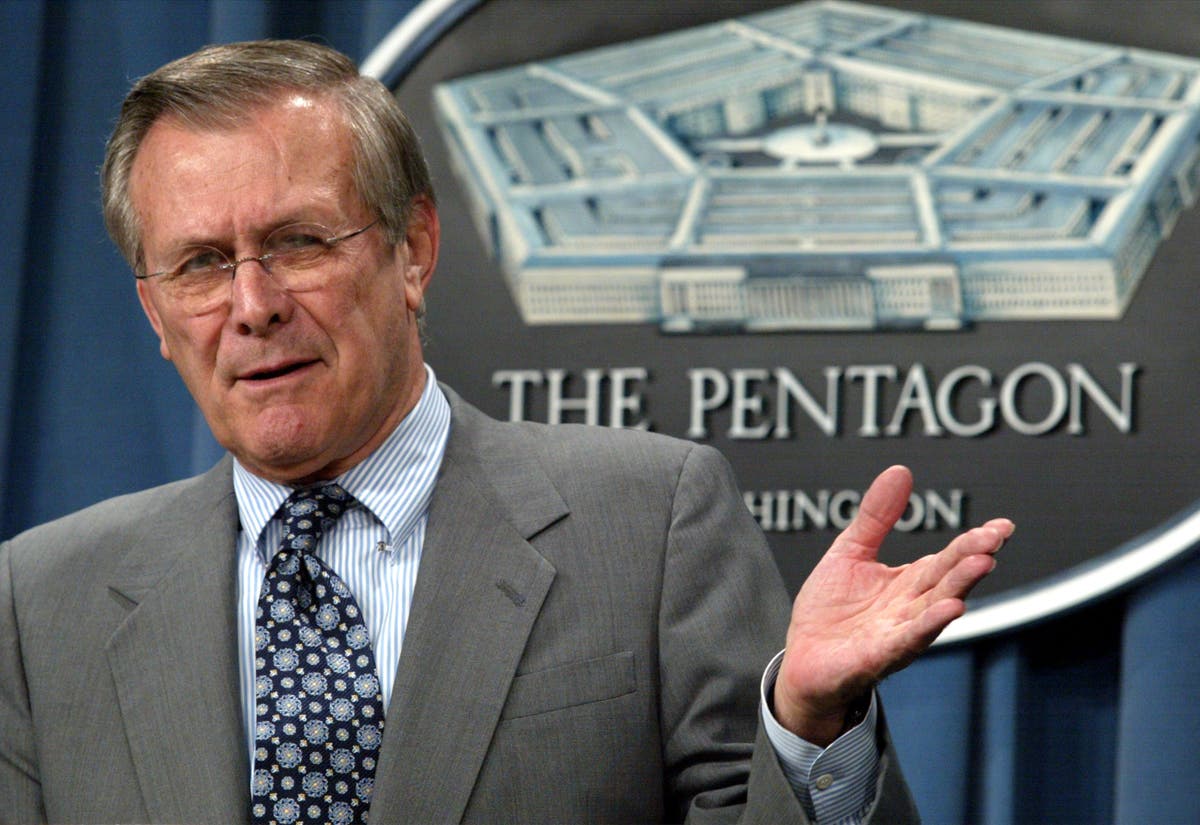Donald Rumsfeld: From the ‘known unknowns’ to defence of prisoner ‘torture’

Anyone watching Donald Rumsfeld’s briefings about the invasion of Iraq, needed to be ready to keep pinching themselves.
Firstly there was the bespectacled swagger and confidence, about things that rapidly proved wrong. He smiled and charmed, threw out soundbites that in Washington DC amounted to poetry.
Pretty soon, his Pentagon briefings were a “must-watch” and the defence secretary was appearing on the cover of magazines. The National Journal called him a “pin up”.
And all the while, the bodies piled up, as did the scandals.
Before long, even the most naive and unquestioning had given up the idea that Saddam Hussein possessed weapons of mass destruction. And pretty soon, too, they had foregone the belief that the United States and Britain could invade another country and simply impose their version of democracy.
Then he had to stand down.
“I leave with great respect for you and for the leadership you have provided during a most challenging time for our country,” he wrote in a letter to George W Bush in 2006.
“The focus, determination and perseverance you have so consistently provided have been needed and are impressive.”
Rumsfeld, who has died at the age of 88, had served as defence secretary under Gerald Ford, and when Bush was elected in 2000, he asked Rumsfeld to fill the position again.
As it was, eight months after Bush’s inauguration, America was stunned by the terror attacks of 9/11, and many in the nation were looking for revenge. Rumsfeld oversaw first the October 2001 invasion of Afghanistan, whose Taliban rulers had given shelter to Osama bin Laden.
At this point, there was nothing to link Iraq to the attacks on New York and Washington DC that had left more than 3,000 dead. But from the very first hours after the attack, Bush was seeking a link with Baghdad, despite UN weapons inspectors saying Saddam had ended his WMD programme years earlier.
According to former counterterrorism adviser, Richard Clarke, he told Bush that Bin Laden and Al-Qaeda was responsible. “I know, I know, but . . . see if Saddam was involved. Just look. I want to know any shred,” Bush told him, according to Clark’s book, Against All Enemies.
But Bush was not the only one looking to blame Iraq. Even before they took office, Rumsfeld, his deputy Paul Wolfowitz, and Dick Cheney, had all signed onto the founding principles of the Project for a New American Century, a neo-conservative think-tank that sought regime change in Iraq
✕ Deciphering Donald Rumsfeld — The Former Defense Secretary Becomes Subject of Oscar-Winner’s Latest Documentary
Rumsfeld had once been photographed shaking hands with Saddam, when he flew to Iraq in 1983 as Ronald Reagan’s special envoy, when the US provided massive financial aid in its war against Iran.
Two decades later, in February 2002, was asked about the apparent lack of evidence linking Iraq to terror groups.
“Reports that say that something hasn’t happened are always interesting to me, because as we know, there are known knowns,” he said.
“There are things we know we know. We also know there are known unknowns. That is to say we know there are some things we do not know. But there are also unknown unknowns – the ones we don’t know we don’t know.”
Yet, for all the nice soundbites, things in Iraq quickly turned sour – for Iraqi civilians, hundreds of thousands of whom would perish because of that false intelligence, for thousands of American and British troops who lost their lives, and for Rumsfeld.
In 2004, the US faced global condemnation after photos showed American troops smiling and laughing as Iraqi prisoners were forced into sexually abusive and humiliating positions including a naked human pyramid and simulated sex at the Abu Ghraib prison in Baghdad.
George W Bush and Rumseld in 2019 (AFP via Getty Images)
Under Bush, along with Guantanamo Bay, the US had established a network of “black sites” where prisoners were interrogated using water-boarding, and other techniques many considered torture.
As one of the public faces of the so-called “war on terror”, Rumsfeld defended the administration’s actions.
A 2008 Senate report found that the abuse of prisoners at Abu Ghraib, “was not simply the result of a few soldiers acting on their own” but grew out of interrogation policies approved by Rumsfeld and other top officials, who “conveyed the message that physical pressures and degradation were appropriate treatment for detainees”.
Rumsfeld met with Saddam Hussein in Iraq in 1983 (Getty Images)
Robert Gates, a soft-spoken but demanding former CIA director, took over from Rumsfeld in December 2006 and made sweeping strategic and military leadership changes in Iraq.
In the years that followed, Rumsfeld would take on a large part of the blame for the conduct of the war, based on false intelligence, and carried out with a modest force. He had written off the chaos of people searching for food and looting in the aftermath of the invasion as the exuberance that came with new found freedom.
“Freedom’s untidy, and free people are free to make mistakes and commit crimes and do bad things,” Rumsfeld said.
“They’re also free to live their lives and do wonderful things. And that’s what’s going to happen here.”
Additional reporting by Reuters






